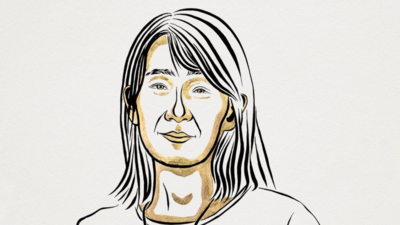The Nobel prize in Literature 2024 has been awarded to South Korean author Han Kang “for her intense poetic prose that confronts historical traumas and exposes the fragility of human life.”
The Nobel committee at the Royal Swedish Academy of Sciences made this announcement on Thursday.
The Nobel announcements, spanning six days, began on Monday with Americans Victor Ambros and Gary Ruvkun being honored with the Nobel Prize in Medicine.
Later on Tuesday, the 2024 Nobel Prize in Physics was awarded to John J. Hopfield and Geoffrey E. Hinton “for foundational discoveries and inventions that enable machine learning with artificial neural networks.” Their work has significantly contributed to the development of modern machine learning.
On Wednesday, the 2024 Nobel Prize in Chemistry was awarded to David Baker “for computational protein design” with the other half jointly awarded to Demis Hassabis and John M. Jumper “for protein structure prediction.”
Who is Han Kang
Han Kang’s work is marked by a dual exploration of pain, highlighting the interplay between mental and physical suffering, deeply rooted in Eastern philosophy.
In Han Kang’s short story ‘Europa’, a male narrator, disguised as a woman, becomes captivated by an enigmatic figure who has escaped an unendurable marriage. When his beloved inquires: “If you were able to live as you desire, what would you do with your life?” the narrator remains silent.
In her novel ‘Human Acts,’ Kang anchors her narrative in the historical event of the Gwangju massacre, where she grew up. In 1980, hundreds of students and unarmed civilians were killed by the South Korean military.
Here’s all you need to know about the prize
- The Nobel Prize in Literature has been awarded 116 times to 120 laureates from 1901 to 2023.
- The accolade was not awarded on seven occasions: in 1914, 1918, 1935, 1940, 1941, 1942, and 1943.
- 17 women have received the Nobel Prize in Literature. The first was Swedish author Selma Lagerlöf, who won the prize in 1909. Notably, she was awarded five years before her election to the Swedish Academy, the institution responsible for selecting Nobel laureates in literature.
- It has been shared by two laureates on only four occasions. In contrast, sharing the prize is more common in other Nobel categories.
- Rudyard Kipling is the youngest literature laureate. Awarded at the age of 41, in 1907, “in consideration of the power of observation, originality of imagination, virility of ideas and remarkable talent for narration which characterize the creations of this world-famous author.”
- Doris Lessing is the oldest literature laureate. Awarded at age 87, in 2007, Lessing is “that epicist of the female experience, who with scepticism, fire and visionary power has subjected a divided civilisation to scrutiny.”
